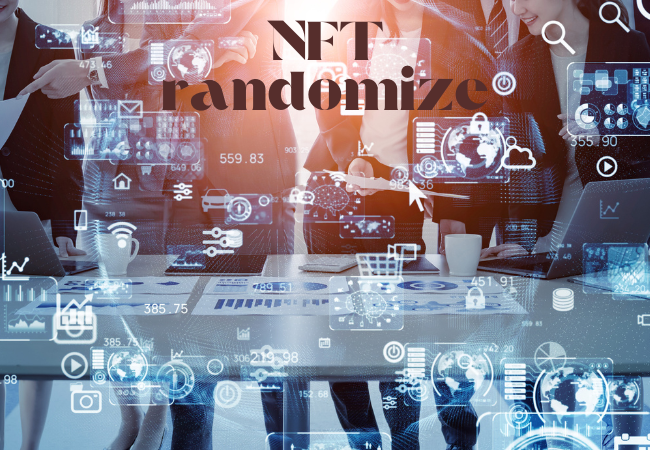In the world of NFTs, randomization plays a crucial role in creating unique and valuable digital assets. This article delves into the concept of nftrandomize, exploring its significance, methods, applications, and future trends.
What is NFT Randomize?
NFT randomization refers to the process of introducing random elements into the creation of non-fungible tokens (NFTs). This ensures that each NFT is unique, enhancing its rarity and value. Randomization can apply to various aspects such as visual traits, metadata, and functionalities of the NFTs.
The Importance of Randomization in NFTs
Randomization is vital in the NFT ecosystem for several reasons. It not only enhances the uniqueness of each token but also promotes fair distribution and increases user engagement. By ensuring that no two NFTs are identical, creators can maintain a higher level of intrigue and excitement among collectors and users.
How NFT Randomization Works
NFTrandomize involves using algorithms and various techniques to introduce randomness into the creation process. These methods ensure that each NFT generated is distinct and possesses unique attributes.
Algorithms Used in NFT Randomization
Several algorithms are used in NFTrandomize, including pseudorandom number generators (PRNGs), cryptographic random number generators, and blockchain-based randomness sources. Each algorithm has its own strengths and is chosen based on the specific requirements of the NFT project.
Common Techniques for Randomizing NFTs
Some common techniques for randomizing NFTs include layering different traits, using generative art scripts, and employing smart contracts that randomize elements during minting. These techniques ensure that the final output is unpredictable and unique.
Examples of NFT Projects Using Randomization
Prominent NFT projects like CryptoPunks, Bored Ape Yacht Club, and Art Blocks have successfully implemented randomization to create highly sought-after and unique digital assets. These projects have set benchmarks for how effective randomization can enhance the value and appeal of NFTs.
Benefits of NFT Randomization
Enhancing Rarity and Value
Randomization significantly enhances the rarity and value of NFTs. By ensuring each token is unique, it creates a sense of exclusivity that attracts collectors and investors.
Increasing User Engagement
Randomized NFTs can increase user engagement by adding an element of surprise and excitement. Users are more likely to participate in the minting process when there is a chance to acquire rare and unique items.
Promoting Fair Distribution
Randomization helps promote fair distribution of NFTs, preventing any predictable patterns that could be exploited. This ensures that every participant has an equal opportunity to obtain valuable assets.
Challenges in NFT Randomization
Ensuring True Randomness
One of the main challenges in NFT randomization is ensuring true randomness. Pseudorandom number generators can sometimes produce predictable patterns, which can undermine the integrity of the randomization process.
Addressing Scalability Issues
Scalability can be a concern when implementing randomization in large-scale NFT projects. Ensuring that the randomization process remains efficient and effective as the project grows is crucial.
Dealing with Complexity in Design
The complexity of designing and developing randomized NFTs can be daunting. It requires a deep understanding of both creative and technical aspects to ensure that the final product is both unique and valuable.
NFT Randomization in Gaming
Creating Unique In-Game Assets
In the gaming industry, randomization is used to create unique in-game assets. These assets can include characters, weapons, skins, and other items that enhance the gameplay experience.
Boosting Player Interest
Randomized in-game assets can significantly boost player interest and engagement. The possibility of acquiring rare and unique items keeps players motivated and invested in the game.
Balancing Gameplay Through Randomization
Randomization also helps in balancing gameplay by ensuring that no two players have the exact same assets. This prevents any one player from having an unfair advantage, promoting a more balanced and enjoyable gaming experience.
NFT Randomization in Art
Generating Unique Art Pieces
Artists use randomization to generate unique art pieces that stand out in the crowded NFT marketplace. This can involve generative art techniques that use algorithms to create distinct visual elements.
Collaboration Between Artists and Technologists
The process of NFTrandomize often involves collaboration between artists and technologists. Artists bring their creative vision, while technologists provide the tools and expertise needed to implement randomization effectively.
Marketplaces for Randomized Art NFTs
Several NFT marketplaces specialize in randomized art, providing platforms for artists to showcase and sell their unique creations. These marketplaces attract collectors who value the novelty and exclusivity of randomized art.
NFT Randomization in Collectibles
Developing Rare Collectibles
Randomization is a key factor in developing rare and valuable collectibles. By introducing unique traits and attributes, creators can ensure that each collectible stands out.
Collectors’ Appeal and Value
The appeal of randomized collectibles lies in their rarity and uniqueness. Collectors are often willing to pay a premium for items that are one-of-a-kind, driving up the value of these NFTs.
Successful Randomized Collectible Projects
Projects like CryptoKitties and NBA Top Shot have successfully utilized randomization to create highly desirable and valuable collectibles. These projects have demonstrated the potential of randomization in the NFT collectible market.
Future Trends in NFTrandomize
Advanced Randomization Techniques
As technology advances, new and more sophisticated randomization techniques are emerging. These techniques promise to enhance the uniqueness and value of NFTs even further.
Integration with AI and Machine Learning
The integration of AI and machine learning with NFT randomization is an exciting future trend. These technologies can be used to create even more complex and unpredictable randomization processes.
Potential Impact on Different Industries
The potential impact of NFT randomization extends beyond art and gaming. Industries such as fashion, real estate, and entertainment are exploring how they can leverage randomization to create unique and valuable digital assets.
Getting Started with NFT Randomization
Choosing the Right Platform
Selecting the right platform is crucial when starting with NFT randomization. Platforms like Ethereum, Binance Smart Chain, and Polygon offer various tools and resources for implementing randomization.
Tools and Resources for NFTrandomize
There are numerous tools and resources available for NFTrandomization, including open-source libraries, development kits, and online tutorials. These can help creators implement randomization effectively.
Best Practices for Implementation
Following best practices for implementing NFT randomization can ensure success. This includes thorough testing, using secure randomization methods, and continuously refining the process based on feedback and results.
Case Studies of Successful NFT Randomization Projects
Examining case studies of successful NFTrandomization projects can provide valuable insights and inspiration. These case studies highlight the challenges, solutions, and outcomes of various projects that have effectively utilized randomization.
Frequently Asked Questions
What makes NFT randomization important?
NFT randomization is important because it ensures uniqueness, enhances value, and promotes fair distribution.
How can I ensure the randomness of my NFTs?
Using secure and tested algorithms, avoiding predictable patterns, and thorough testing can ensure the randomness of NFTs.
What are the benefits of using randomization in NFTs?
The benefits include increased rarity and value, higher user engagement, and fair distribution of assets.
Can randomization be applied to any type of NFT?
Yes, randomization can be applied to various types of NFTs, including art, gaming assets, and collectibles.
Are there any risks associated with NFT nftrandomize
Risks include ensuring true randomness, scalability challenges, and complexity in design.
How do I start creating randomized NNFTs?
Begin by choosing the right platform, utilizing available tools and resources, and following best practices for implementation.
Conclusion
NFT randomization is a powerful tool that enhances the uniqueness, value, and appeal of digital assets. By understanding its importance, benefits, and challenges, creators can effectively utilize randomization to create compelling and valuable NFTs. As technology continues to evolve, the future of NFT randomization promises even more exciting possibilities and innovations.




